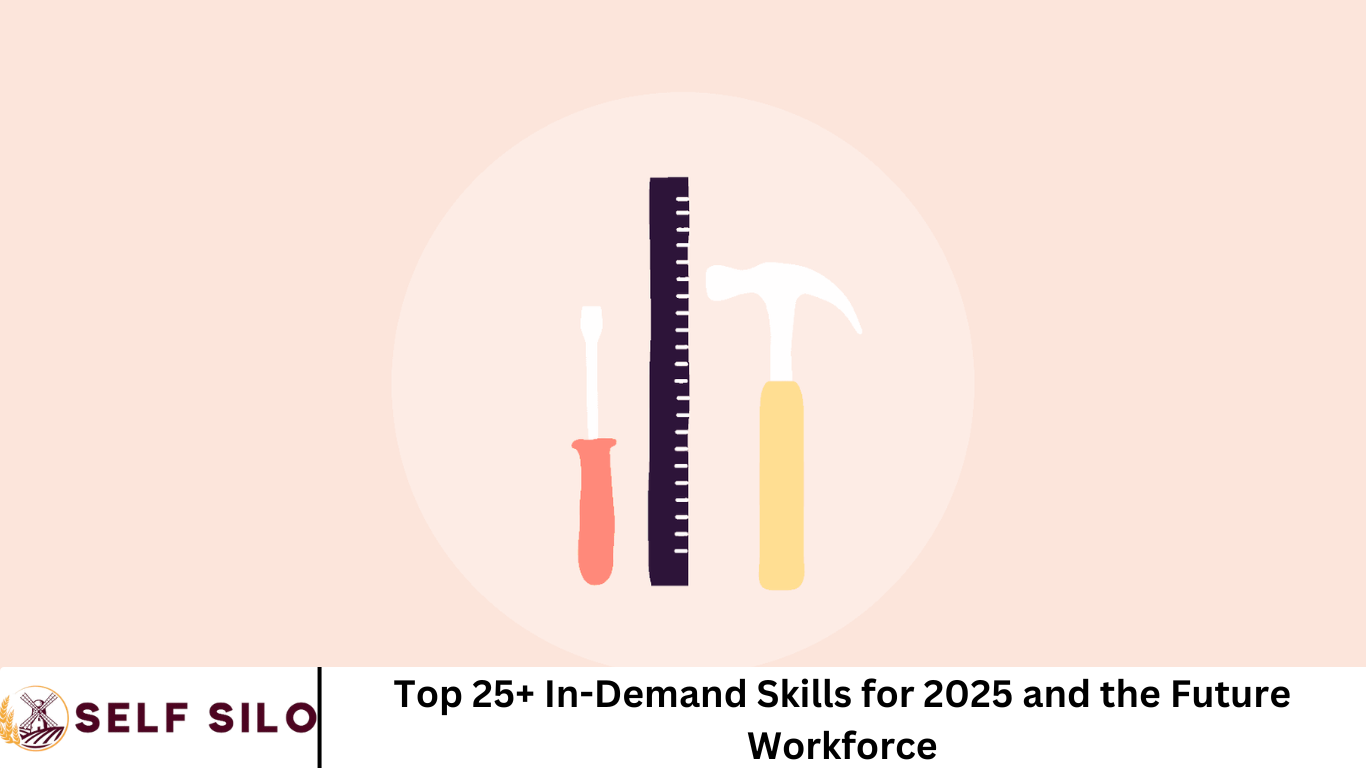As we approach 2025, the future of work is being shaped by rapid technological advancements, global shifts, and evolving workforce expectations. To stay relevant in the changing job market, both individuals and organizations must prioritize continuous learning and skills development.
According to a recent study, 83% of HR leaders believe workforce demand is evolving faster than employees’ skills can adapt. Understanding the most in-demand skills for 2025 and beyond is essential for staying competitive, future-proofing careers, and driving business success.
This comprehensive guide explores the top 25+ in-demand skills that will dominate the future workforce and provides insights into why these skills matter in an increasingly digital, data-driven, and dynamic world.
More Read: Creating a Personal Development Plan: 3 Real-Life Examples
1. Digital Literacy
Digital literacy goes beyond basic computer skills. It includes the ability to use digital tools, platforms, and software efficiently and ethically. As organizations digitize operations, employees must be comfortable navigating digital environments.
2. Data Literacy
With data at the heart of business decisions, understanding how to interpret, analyze, and communicate data is vital. Data-literate professionals can transform insights into strategy and action.
3. Artificial Intelligence (AI) and Machine Learning (ML)
AI and ML are transforming industries. Skills in developing, managing, and understanding AI-powered tools will be in high demand for roles across tech, healthcare, finance, and more.
4. Cloud Computing
Cloud platforms like AWS, Microsoft Azure, and Google Cloud are integral to modern IT infrastructure. Proficiency in cloud architecture, security, and services is essential for tech roles.
5. Cybersecurity
As digital threats increase, cybersecurity skills are critical. Organizations need professionals who can safeguard data, networks, and systems from attacks.
6. Business Intelligence (BI)
BI tools help companies make data-driven decisions. Skills in platforms like Power BI, Tableau, and Looker enable professionals to derive meaningful insights from data.
7. Project Management
With remote work and agile teams becoming the norm, strong project management skills—particularly with tools like Asana, Jira, and Trello—are more important than ever.
8. Emotional Intelligence (EQ)
EQ is the ability to understand and manage your own emotions and those of others. High EQ enhances communication, teamwork, and leadership—key skills for hybrid and diverse teams.
9. Creativity and Innovation
As automation takes over routine tasks, creative thinking becomes a key differentiator. The ability to generate original ideas and solutions is essential in problem-solving and product development.
10. Critical Thinking
In a world of information overload, critical thinking helps individuals analyze facts, question assumptions, and make sound decisions. It’s crucial for roles involving strategy, leadership, and policy-making.
11. Adaptability and Flexibility
Change is constant in today’s workplace. The ability to adapt to new tools, workflows, and environments is vital for career longevity.
12. Communication Skills
Strong written and verbal communication skills are necessary across all industries. Being able to convey ideas clearly and collaborate effectively is critical, especially in remote or cross-functional teams.
13. Collaboration and Teamwork
Interdisciplinary collaboration is on the rise. Professionals who can work well in diverse, global teams bring immense value to organizations.
14. Leadership and People Management
Leadership is evolving. Empathy, vision, and the ability to manage remote and cross-cultural teams are becoming central to effective management.
15. UX/UI Design
As digital products proliferate, user-centric design is crucial. Skills in UX/UI help organizations build intuitive, accessible, and engaging digital experiences.
16. Software Development
Coding skills remain a cornerstone of tech innovation. Languages like Python, JavaScript, and Java are especially valuable.
17. Blockchain
Blockchain is gaining traction beyond cryptocurrency. Skills in blockchain development, smart contracts, and decentralized apps are increasingly in demand.
18. Digital Marketing
Digital channels dominate marketing strategies. Skills in SEO, SEM, content creation, and analytics are crucial for reaching modern audiences.
19. Financial Literacy
Understanding financial principles helps professionals make better business decisions. Skills in budgeting, forecasting, and financial analysis are valuable in all sectors.
20. Sustainability and Green Skills
As organizations pursue environmental goals, green skills—such as energy efficiency, carbon accounting, and sustainable sourcing—are becoming critical.
21. Language and Multicultural Competency
In a globalized economy, the ability to communicate across languages and cultures enhances collaboration and market reach.
22. Sales and Customer Relationship Management
Sales remains a vital function. Understanding customer needs and building strong relationships using CRM tools like Salesforce is essential.
23. Resilience and Stress Management
Workplace stress is at an all-time high. Resilient professionals can maintain productivity and mental well-being in challenging conditions.
24. Ethics and Responsible Tech Use
As tech influences more of our lives, ethical considerations are paramount. Professionals must understand data privacy, AI ethics, and responsible innovation.
25. Lifelong Learning Mindset
The most valuable skill is the ability to keep learning. Staying curious and continuously upskilling is the key to long-term career success.
26. Remote Work Proficiency
Remote and hybrid work is here to stay. Being proficient in virtual collaboration, digital etiquette, and remote productivity tools is now essential.
Frequently Asked Question
What are the most in-demand skills in 2025?
The most in-demand skills in 2025 include digital literacy, data literacy, cloud computing, artificial intelligence (AI), cybersecurity, emotional intelligence, and adaptability. These reflect the growing need for tech-savvy, resilient, and collaborative professionals.
Why are digital and data literacy important for the future workforce?
Digital and data literacy are foundational in a tech-driven world. As organizations increasingly rely on digital tools and data for decision-making, professionals must be equipped to navigate digital environments and interpret data accurately.
How can I future-proof my career with these skills?
You can future-proof your career by continuously learning new technologies, developing soft skills like communication and critical thinking, and gaining certifications in high-demand areas such as cloud computing, AI, and project management.
Are soft skills still relevant in the age of automation?
Absolutely. Soft skills like emotional intelligence, adaptability, creativity, and communication are more important than ever. While automation handles routine tasks, human-centric skills drive innovation and collaboration.
Which industries are most impacted by the future skill demands?
Industries such as technology, healthcare, finance, energy, and education are being significantly transformed. Skills like AI, cybersecurity, green energy expertise, and digital marketing are particularly crucial in these sectors.
What role does lifelong learning play in career success by 2025?
Lifelong learning is essential. With the rapid pace of change, professionals must continually update their skills to remain competitive. A growth mindset and ongoing education are key to thriving in the future workforce.
How can organizations prepare their workforce for 2025 and beyond?
Organizations can prepare by investing in upskilling and reskilling programs, fostering a culture of innovation, supporting remote work proficiency, and emphasizing soft skills development alongside technical training.
Conclusion
The workforce of 2025 and beyond will be defined by adaptability, digital fluency, and emotional intelligence. To stay ahead, professionals must embrace continuous learning, and organizations must invest in strategic upskilling initiatives. Whether you’re a job seeker, business leader, or lifelong learner, understanding and cultivating these top in-demand skills is the smartest move you can make today to prepare for tomorrow’s challenges.


